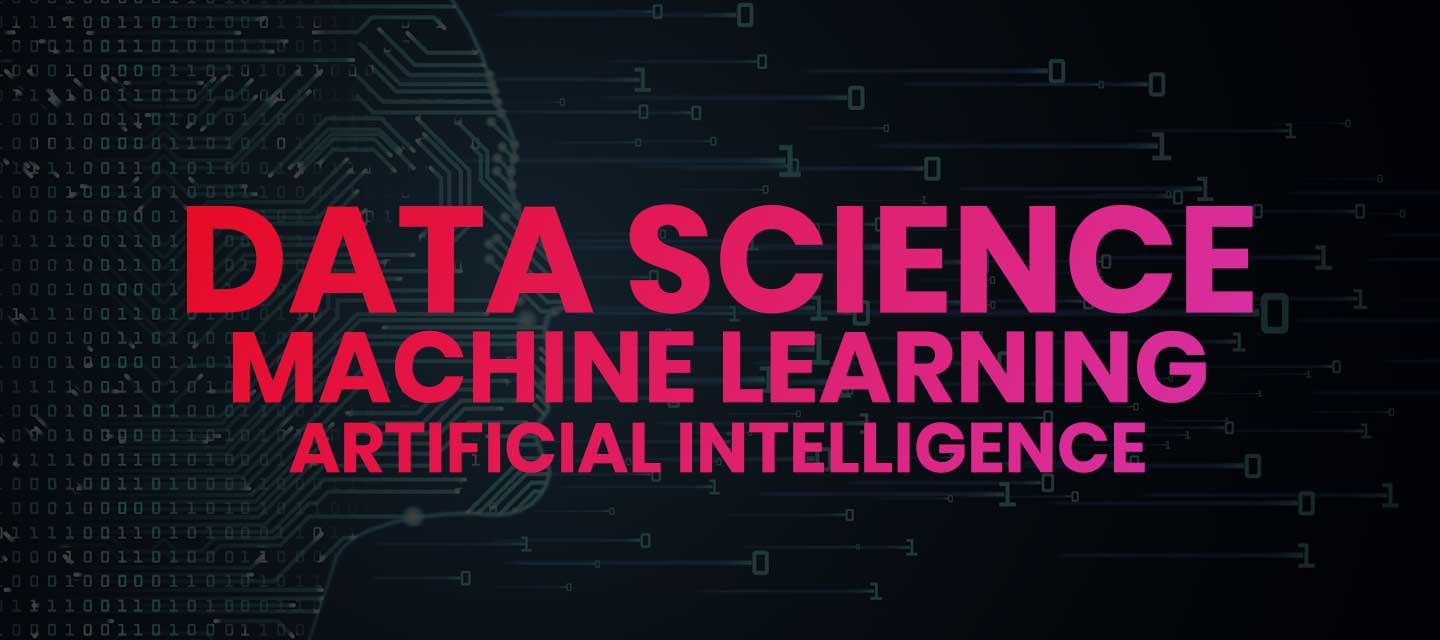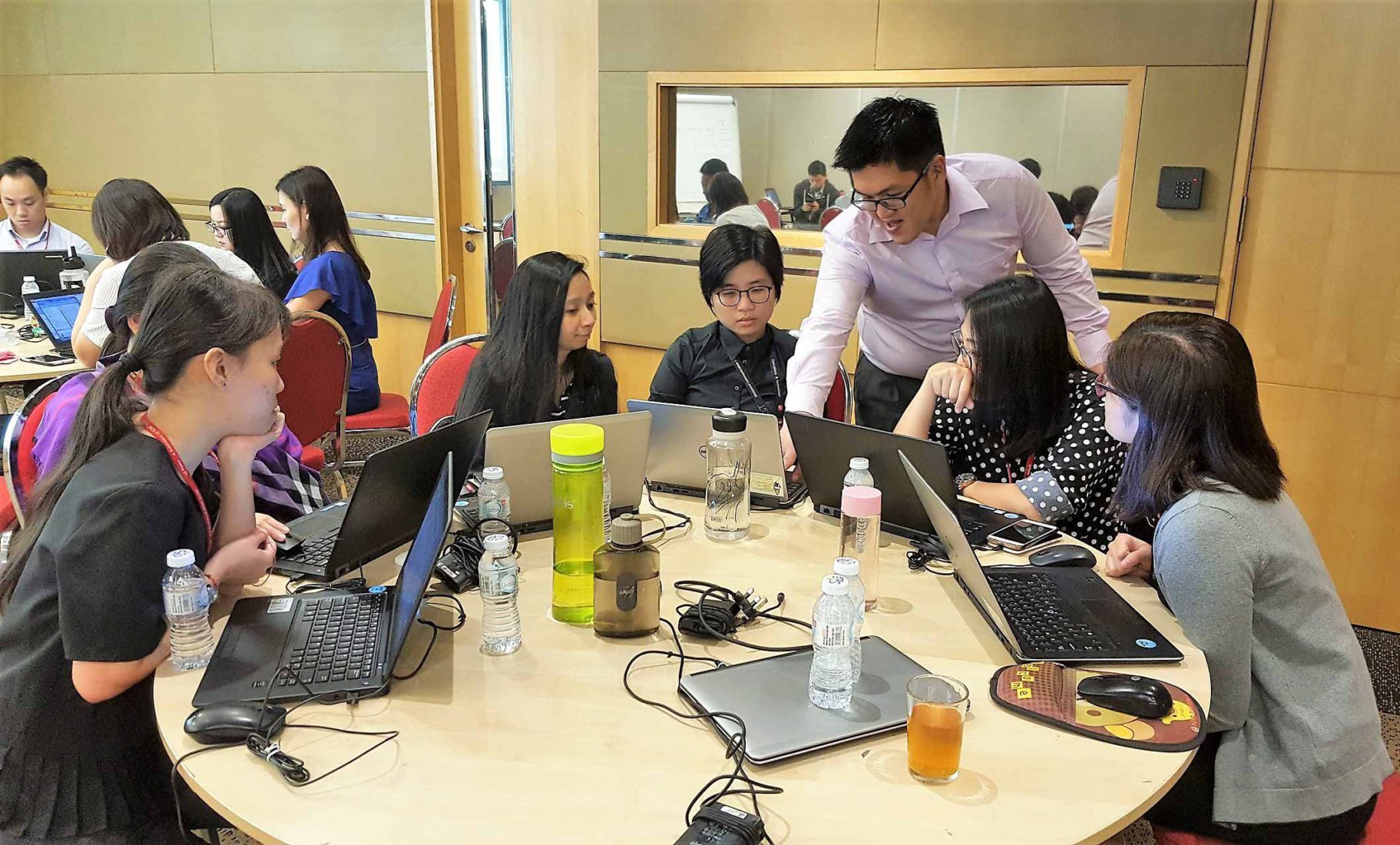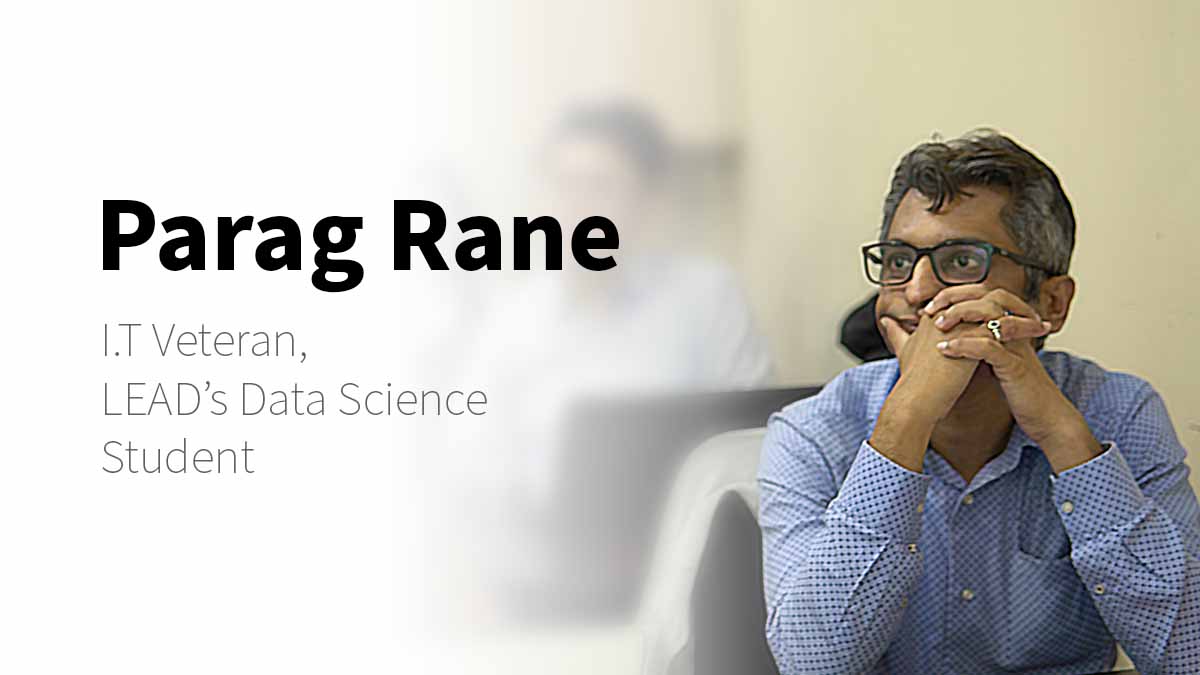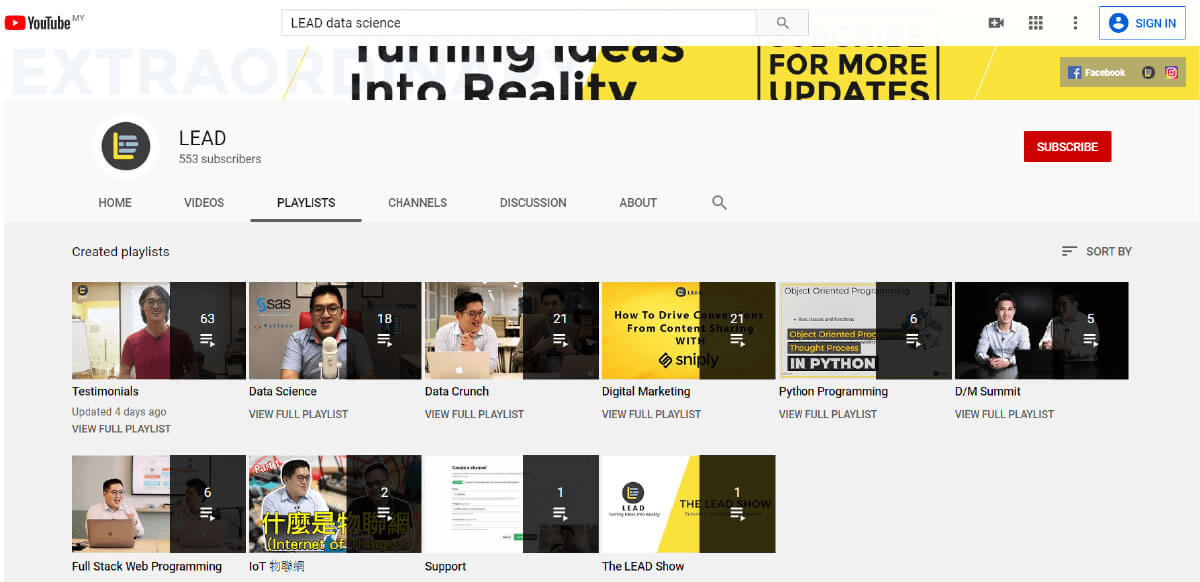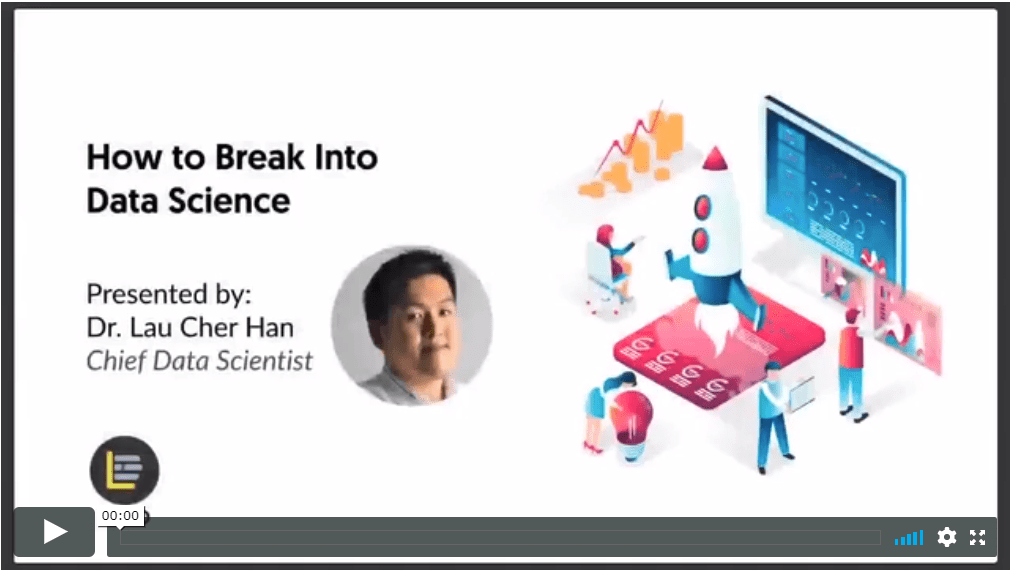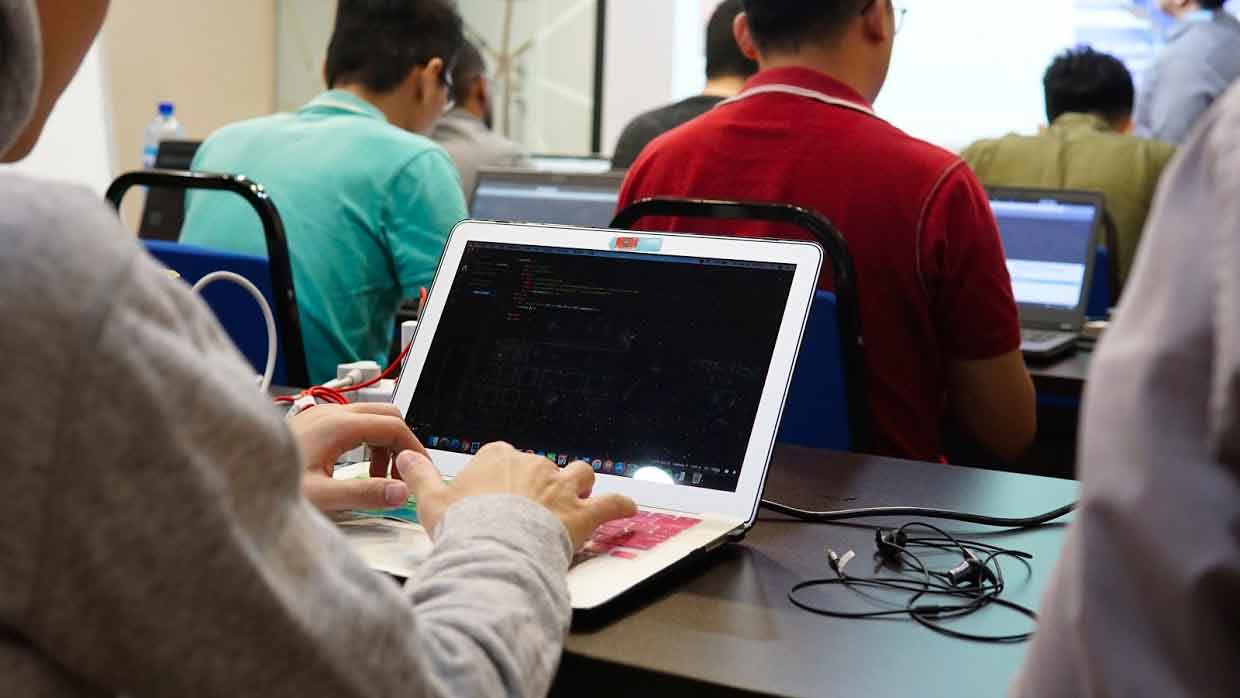The Ultimate Guide To Learning Data Science
This probably is the only data science guide you’ll need.
Learn data science and harness the power of AI, big data analytics, and machine learning the smart way – and build your dream career.
12 mins read
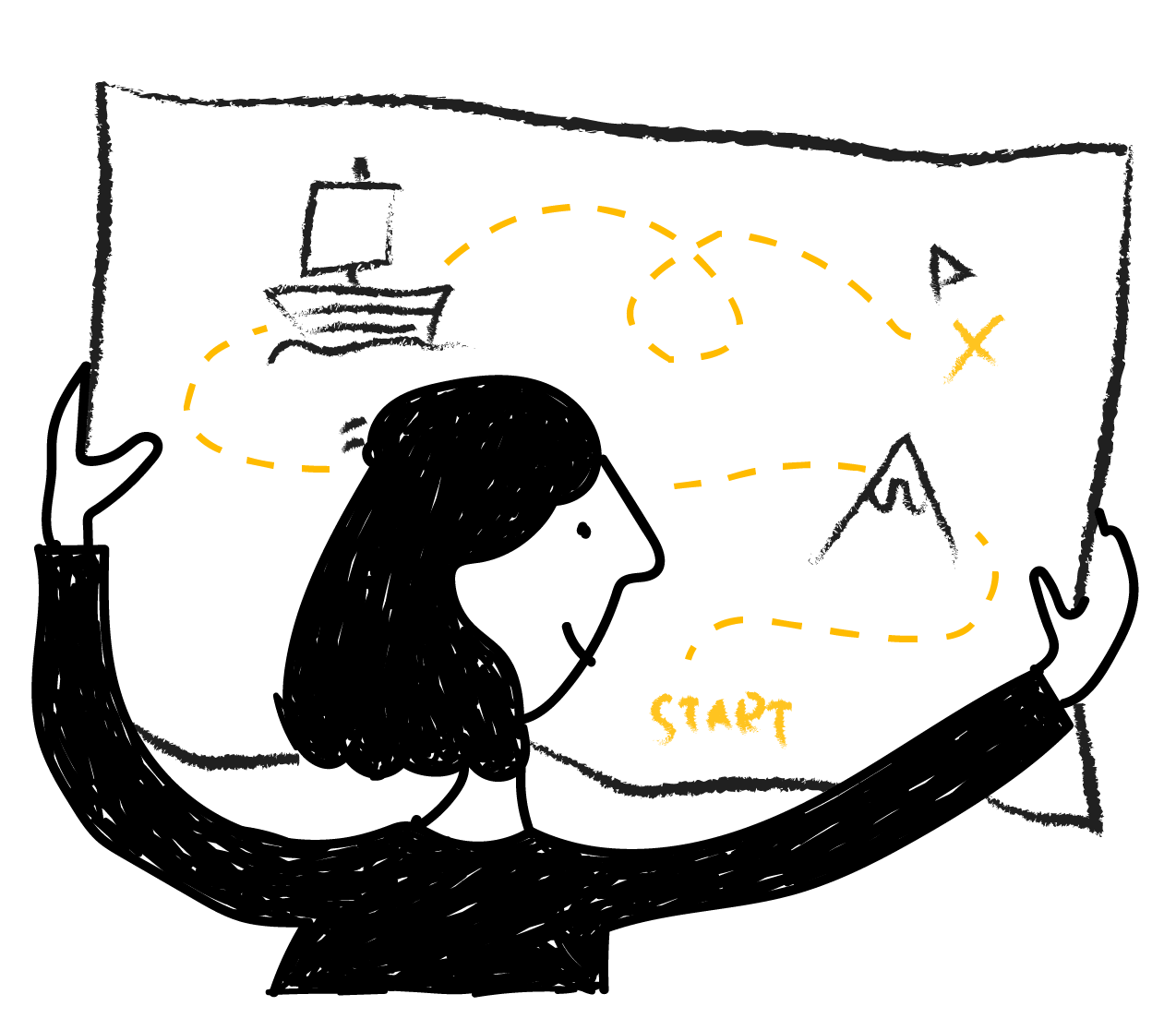
We understand you’ve spent like a crazy amount of time Googling and searching for the best data science resources and knowledge online – you’ll come across Datacamp, Dataquest, Udemy, etc. online courses – free and paid.
You may even have invested your time and money in it, and find it decent and technically-focus. It’s all great, but what can you do next? How do you take it to the next level?
We liked to challenge that – the “online course to industry” gap, hence the creation of this ‘ultimate’ guide – aim to build not just your technical skills but more importantly point you at the right direction and approach in learning data science, becoming a ‘kickass’ data scientist or data professional within 12 mins.
Data Science 101 —–
Let’s Start With The Basics
What is data science – is it Artificial Intelligence, is it Machine Learning Models, is it something to do with Big Data?
Most of the time, it’s a challenge to distinguish between the above especially you’re new and just got started in this. But there is a huge difference in the approach, intent, applications, models, etc.

Are you able to tell the difference between Artificial Intelligence, Big Data, Machine Learning, and how is data science behind it all?
If you can’t, then read on.
Data science is a combination of mathematics, programming, problem-solving and statistics skills – used to mine data, clean and extract valuable insights from data (structured & unstructured). Data cleaning, data analysis, data wrangling, just to name a few main processes involved in data science.
Big Data is simply a term used to call massive volume of data (structured & unstructured) that is simply too big or move too fast – to be processed with common softwares, say with Microsoft Excel. However, it’s never about how big the data is. It’s what we do with the data. And you’ll find that it’s usually the made-for-profit companies who analyze them, in search for hidden insights that drive better business decisions.
Machine learning (ML) is a subset of artificial intelligence. It’s a field where it gives computer systems the ability to learn by itself, without being explicitly programmed. For example, a computer system to progressively improve on a certain task, without someone to constantly program it.
A relatable example that you can immediately relate to is Facebook algorithm. Facebook’s machine learning algorithms learn about you; your habits, what you like, predicts your interest and shows you content/news updates that you most likely would engage with.
Artificial intelligence (AI) refers to machines that can perform tasks with the characteristics and mimic of human intelligence. When a machine reaches a point where it can think like a human, reflect on its errors make decisions by itself – that’s artificial intelligence.
We hear ML and AI – these two buzzwords quite often, because artificial intelligence cannot exist without machine learning but machine learning can exist without artificial intelligence.
Intro —–
What is a data scientist? (you probably have heard too many versions of it, but take it from the industry practitioners)
As much as the name makes you sound super duper cool, it is important to know what does being a data scientist really means.

A data scientist is someone who is able to lead a team of data analysts or data engineers to work towards solving a business problem, by collecting data and come out with relevant findings which can potentially help the company’s growth.
Data scientists are often team leads, and they will have to be able to manage an entire team to make sure the project goes smoothly while having the technical skills to be able to ensure roadblocks can be overcome in the most efficient way possible.
Usually, it will take you some time to become a data scientist, as not only a prestigious education background and certification is sufficient (even though that helps!), only someone who has potential to be business-centric and analytical mind, often built through years of experience in the industry would have what it takes to become a data scientist.
In short, think of it as a managerial role in the data science industry. It is not something you can just become at the start of your career path, despite your high qualifications; but rather, it takes some years of experience paired with leadership qualities in order to become a data scientist.
Okay, now that you know better what a Data Scientist is, you might have the next question in mind:
The job scope and responsibilities of a data scientist?
Just like any other jobs, a data scientists day to day responsibilities differs, according to the industry and also the nature of projects they are working on. However, here are some main responsibilities of a data scientist in Malaysia:
Data Related Tasks :
As a data scientist, this is pretty much self-explanatory. Data scientists will oversee projects throughout the entire data science pipeline, which can be explained simply in the OSEMN framework:
- Obtaining Data
- Scrubbing Data
- Exploring Data
- Modelling Data
- Interpreting Data
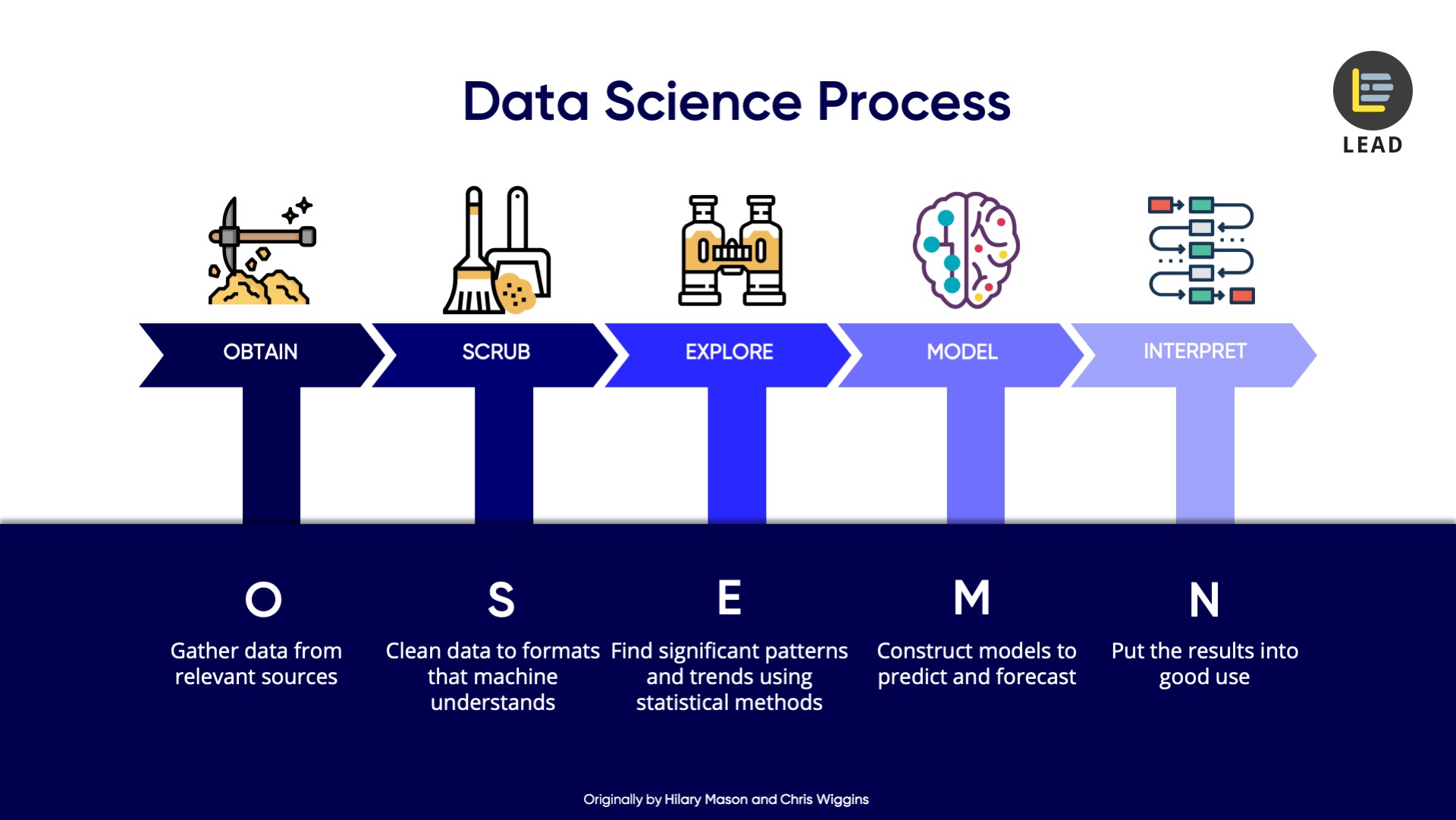
To understand more about the details of these processes in a data project lifecycle, read more HERE. We’ve drilled down into the skills required for each process.
Communications Tasks:
Like what we mentioned above, data scientists hold managerial roles in a company. This means that on top of the actual execution, there will be a lot of meetings and presentations involved in their daily routine.
Data scientists need to often hold meetings with their team, making sure team members are sure of their individual responsibilities, keeping track on the project’s progress, and spotting any potential challenges and solving them as soon as possible.
On top of dealing with the execution team, data scientists will also be responsible for reporting back to the stakeholders on the project’s progress, ensuring that the project serves a business need that can contribute to the company’s success.
Hence, data scientists will need to be able to explain the findings from these data science projects in a business perspective, in order to help the company’s decision-makers make an informed decision to steer the direction of the company.
If all these still very much excites you, then here is what you need to know:
Deep Dive —–
How do I become a data scientist?
Every successful data scientist started somewhere. In fact, they were just like you right now, searching the internet to find out what, why, how, which, where to start learning data science.
This is your start!
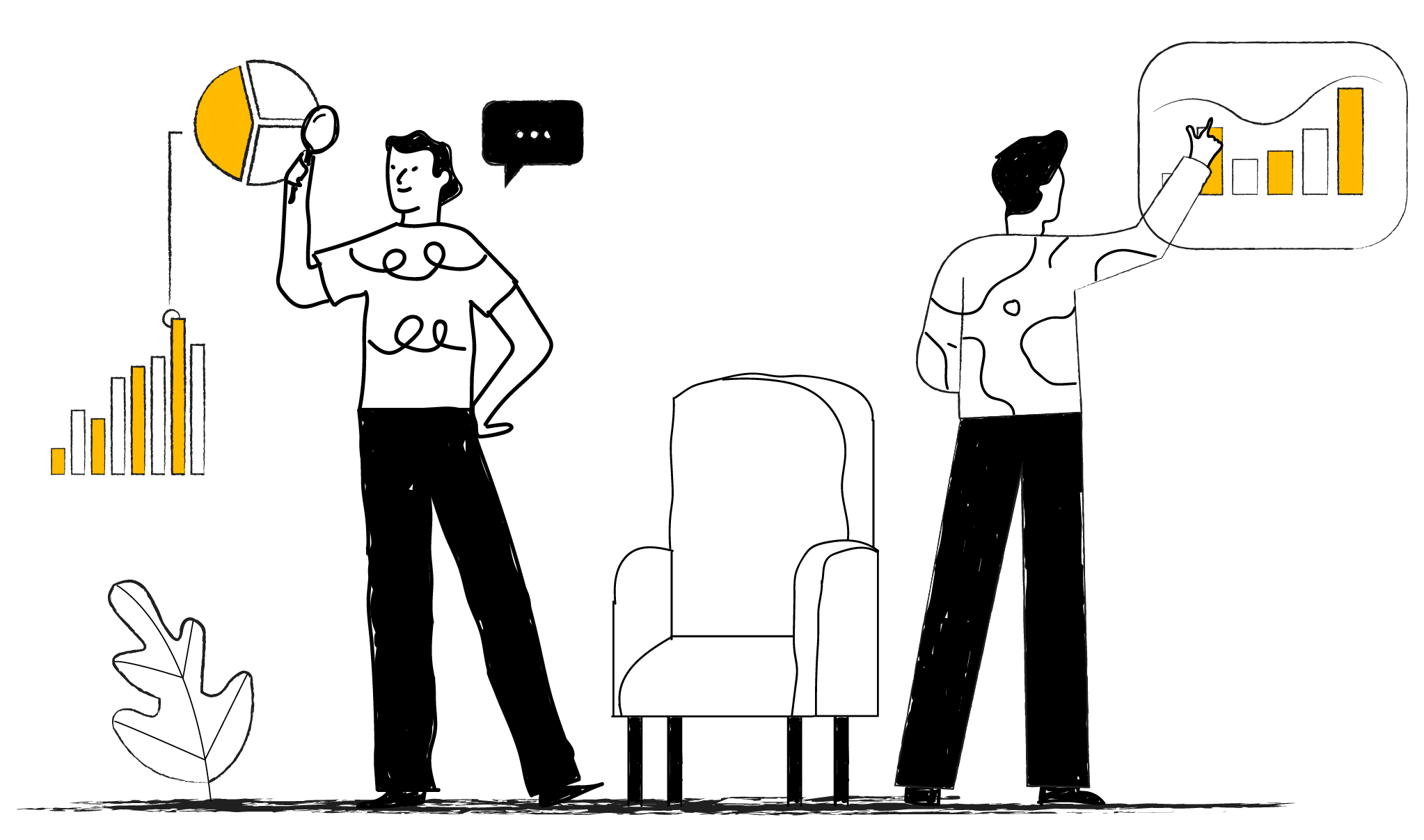
Sure, there are so many articles out there telling you the skills you need to become a data scientist, but in the context of Malaysia, how do you actually tap into the data science industry, and work your way to become the next data scientist?
In this guide, we walk you through how you can prepare yourself to become the next data scientist in Malaysia.
1. Equip yourself with the relevant skillset
If you are looking into building a career in data science, it is undeniable that it requires a set of technical knowledge.
Technical Skills:
One of the most basic skills you can start with is taking up a programming language like Python or R. These languages are the essentials to operate a computer system, analyse and process data.
By learning and mastering your proficiency in these languages, it will be a stepping stone for you to dive into complex problems that you might face as your journey through becoming a data scientist.
Besides programming, you will also need to have a strong command for statistics and mathematical problems. This is going to be very important as you go through the process of data modelling and interpreting data, so you are able to solve a business problem through the data collected, in a way that is logical.
Soft Skills:
On top of just technical skills, if you aspire to do more than the actual technical work of processing data, you need to learn how to present your ideas and solutions in a layman’s term, so that your potential employee or stakeholders will be able to see the value in your work and how you lead the team to achieve what business problem you set out to solve.
Hence, you need to brush up on your presentation and communication skills, so that you can represent your team to translate the data science projects and its findings to the relevant stakeholders, and provide value by steering your company’s efforts.
2. Having a relevant technical background
We have often emphasised on previous articles that a technical background in data science is not essential if you are looking to tap into the industry.
However, if you aspire to become a data scientist (which translates to becoming a professional data whiz), it is definitely important.
(For Students in particular)
If you are currently choosing your course for your tertiary education and have already made up your mind to tap into data science, then a relevant course like statistics, computer science, programming or any IT related courses would help you gain some advantage when you enter the job market.
On top of building the foundation to your skillset, you will also get a better taste of what its like to venture into data science, and give you a clearer insight to whether you would like to continue down this career path or not.
If you have already completed your undergraduate program and is still determined to become a data scientist, you may also look into postgraduate certifications in this field.
With a Masters or PHD in your portfolio, you would have a great advantage in landing a job as a senior data analyst or even a data scientist.
If you choose to study in this field, it will be good for you to talk to a few people in this industry to understand what courses would be a good fit for the nature of the job you aspire to do.
(For those who are in their early-stage career)
If you’re working in a non-technical job and acknowledged that data is the “new oil” – and would like to break into data science, we highly suggest that you look into this free training or join the next webinar which we’ll inform you through our website or facebook page.
(For those who are in their mid-stage career)
There’s not a better time to learn data science, in fact with more experience, whether it’s technical or not, you’ll have an edge over those who are fresher in your industry. The reason being, you’ve acquired the domain expertise which most take years to be proficient in, but you already have the expertise and able to navigate the waters in your industry. Domain expertise – one of the important essential skills in data science.
3. Gain as much experience as possible
If you are truly genuine about this aspiration, you must understand that it takes time to become a successful data scientist – we’re always here to guide and support your growth.
Be it if you are starting out with learning short term courses to understand data science more, or if you are currently still in your first or second job in data science (maybe as a data analysts or engineer), don’t give up.
Through your experiences in working on different projects, you will be exposed to new challenges everyday. By learning to overcome them, you are one step closer to becoming a data scientist.
Besides your everyday work, always learn new skills. Be it a whole new programming language you have never got a chance to learn, or attending workshops on data science from different fields, or even picking up a book on data science, whatever it is, stay humble and keep learning, we promise your knowledge and skills will help you achieve your dream of becoming a data scientist.
So, now you would have understood how you can become a data scientist, in many cases our past alumni, there’s a growing number of individuals who are non-technical, with zero knowledge about data science, but are persistent to pursue it, hence the question of:
Deep Dive —–
Can I learn data science without a technical background?
We’ve seen it again and again. Individuals with no technical background – breaking into a data science career.

Actually, you don’t need any technical or programming background when it comes to data science. In data science, we categorize people as – A-type data scientist or B type data scientist.
An A-type data scientist would be somebody who analytics-driven. You are analyzing numbers and it’s your day job to look at reports and statistics.
B type data scientist would be more of a ‘builder’ type – so someone with a programming background, who moved into the career path of data science. So to be honest, the field of data science is vast. It doesn’t matter if you have programming knowledge or not – everybody can learn data science and eventually become a data scientist.
Listen to the podcast for more here https://www.thelead.io/general/cerebro-by-lead-ep-1
Deep Dive —–
What’s the best pathway to get into data science?
There’s no specific pathway to break into data science, especially the widely misconceived degree ‘requirement’ to get into the field.
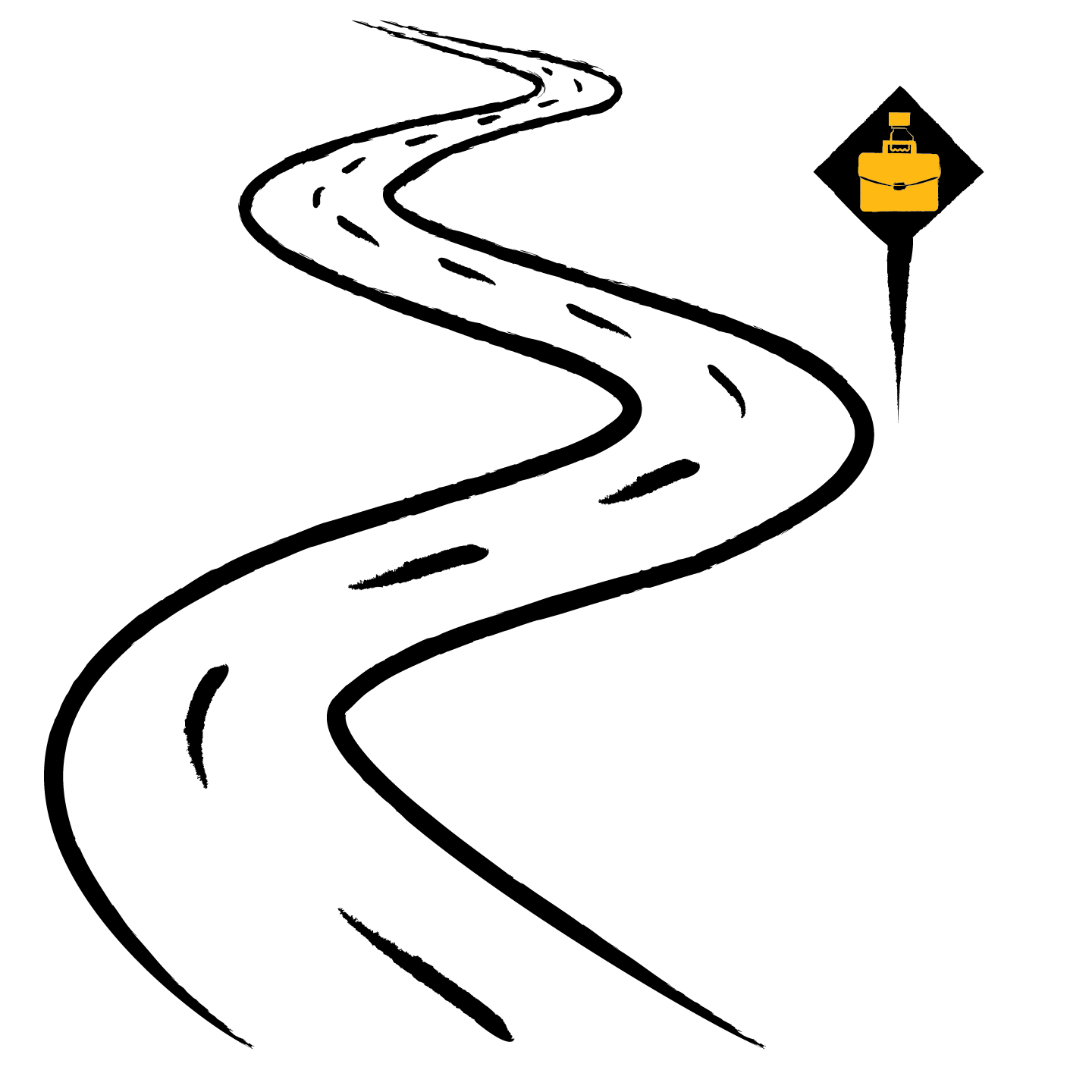
A lot of people who are interested to break into data science, will have this question, “Do I need a degree?” But data science is almost a new field. Before that, it was just a concept. And within data science, you have a lot of different things like machine learning, algebra, mathematics, a bit of programming and a bit of data science, such as database skills for example.
So when it comes to getting a data science degree, most of the degree provided by universities are generally new. You don’t really need to have a data science degree but ideally, if you have a relevant degree, that will be good enough.
Besides, there are many programs out there, such as boot camps or certifications that you can attend. They’ll help you to get onto the right track to begin your data science career path.
You can always check out LEAD’s data science professional certification course. This professional course has been taught to 1000s of individuals from GE, U-mobile, Shell, Intel, Exabytes, etc. – basically from startups, SMEs, and MNCs, it has been proven from time to time the effectiveness for individuals to transform their careers
Deep Dive —–
What are some data science tools to learn?
Is it Python? Is it R language? What is the most used programming language, tools, or libraries for data science?

There is no one right tool to use. But I would say, Python is the more suitable and popular tool that most data scientists would be using.
You can explore what is the most used programming language used for data science.
Python and R are both open source and free, so you can just download, use it and implement all sort of models with it. There are lots of scientific packages that are already implemented, frameworks that are already there. So yeah it’s very easy to get on track.
Unlike some other programming languages, in Python, there is generally the best way of doing something. You can always check out the 3 most important Python libraries for data science: NumPy, Pandas, and Matploylib.
NumPy and Pandas are great for exploring and playing with data. Matplotlib is a data visualization library that makes graphs like you would find in Excel or Google sheet.
You can learn more about a data scientist by peeking into their toolbox.
Deep Dive —–
What type of data science roles are there?
What if I do not want to become a data scientist and my interest are in other data-related areas? We totally understand that, in fact, a data team consist not just a data scientist.
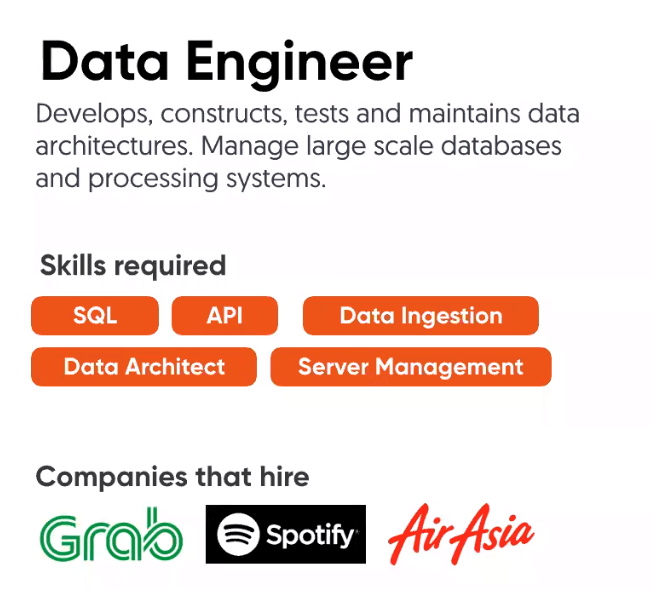
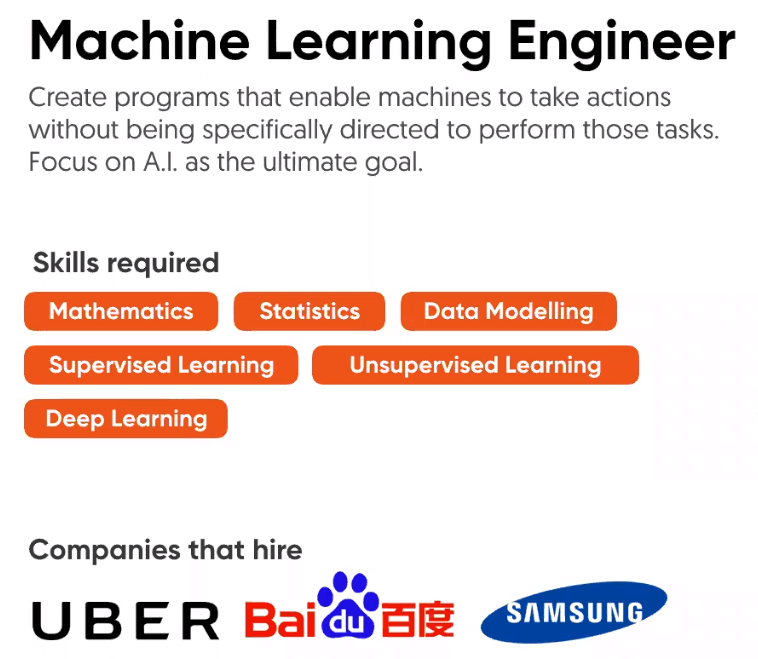
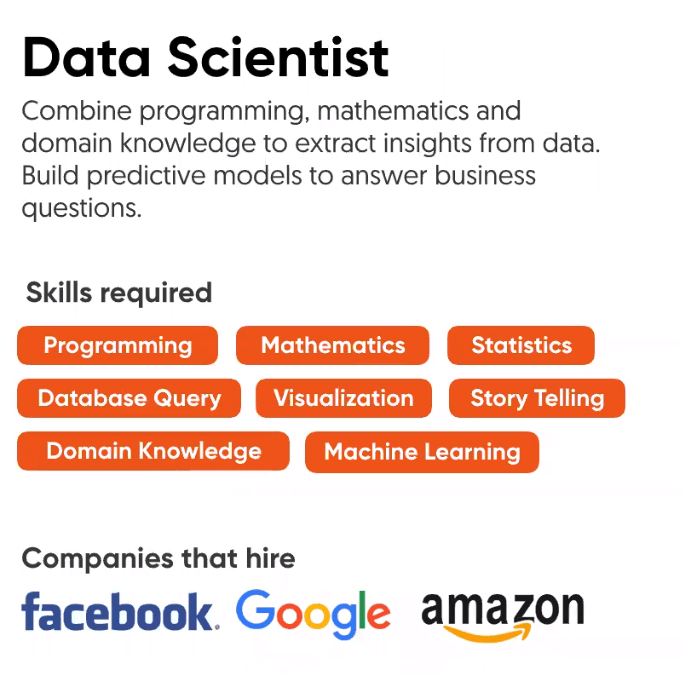
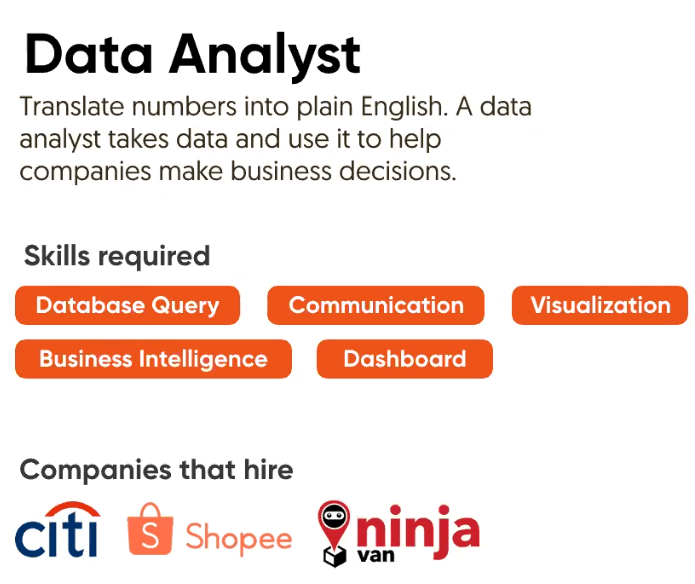
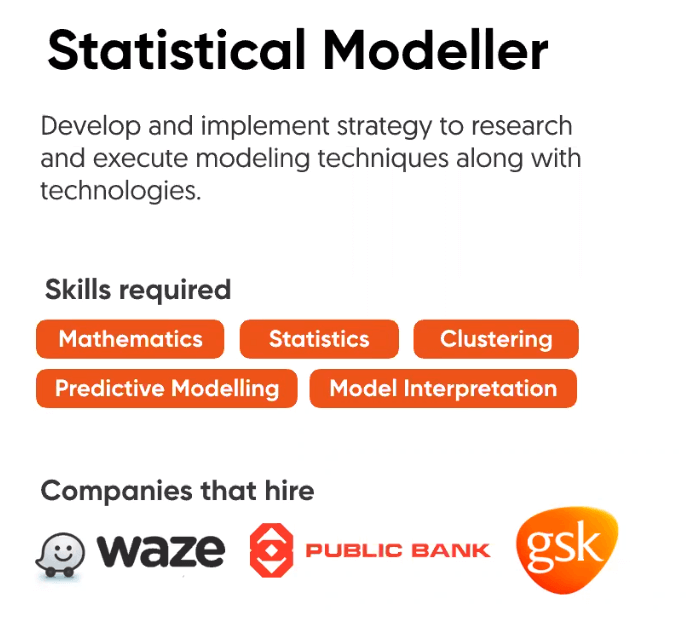
Career Dive —–
How much do data scientists get paid? (data scientist salary)
A highly respectable job and a lucrative paycheck – certainly is!

You must have read the article, where it says data scientist is the sexiest job of the 21st century, right? Let’s start at the top. Whenever people talk about ‘chief’, it usually means the CEO, CTO level. Whenever you’re at a chief level you are usually less involved in the dirty work, but more involved in management.
Usually, at the chief level, the salary you’ll be looking at would be around RM100,000 – RM150,000. If you are in Australia or the US most of the time, then that would be in its local currency.
The entry-level data scientist or data analyst, usually make a good RM4000 – RM6000 on average. Our students who work in corporate companies earn an average salary of RM5,000 to RM6,000.
You can read more in detail about a data scientist salary, how you can be potentially be compensated in Malaysia as a data professional.
Career Dive —–
Will companies ask for a certificate when hiring data scientists?
Data science is still ‘unchartered’ territory for many companies especially SMEs which are more conventional. Most companies that are hiring values data and your job is to drive business value from their data.

We asked our founder and chief data scientist, Dr. Lau about this, here is his answer:
I’ll usually make sure that my students make their own portfolio. In fact, the HR person from most companies usually doesn’t know what sort of questions to ask when hiring a data scientist. So they then ask for a certificate because it’s more like a ‘minimum requirement’ to enter the company.
Take me as an example, my bachelor’s degree is in IT and I picked major of database, followed by my masters and PhD, where I focused more on AI and machine learning.
More importantly is whenever you attend interviews, you have to show the company the values you can bring to the company and if you are able to do the job. And back to your question, most of the time my students apply to work at startup companies, they found that the degree itself is not really that important. I wouldn’t say totally not important, but less important. Skills and know-how usually matter more.
Career Dive —–
Tips for a data science interview preparation.
There will come a day where you’ll be excited yet nervous while walking into your new data role interview session.

Firstly, chill out. Wherever you go for an interview, the HR or the interviewer are usually not so clear about the job scope of the data scientist. Most of the time, we data scientists, know more about data science and the person that is going to hire you know more about their company.
An advice would be to try to take a non-conventional approach rather than just sitting down and asking them about the salary packages. Take the proactive approach, to ask more questions.
Ask them about their business pain points, the business questions that they are facing and how you can help them to save cost or to increase revenue. From there, you show that by using the skill sets that you have, you can bring more value to the company. This is a much better approach rather than the traditional interview-style that most do.
Career Dive —–
What type of companies should I join as a junior data scientist?
Where should I start? especially applying for a new data science or analyst role.

If you’re a junior data scientist, we suggest you to join a startup. At least not a too new startup but a well-funded startup. This is because they will have lots of data for you to play with, but at the same time, they don’t know what to do with all the data.
If you’re someone who is already in the mid of your career, you should already know what you want to do. I’d assume you’re looking for job stability and is comfortable within a corporate environment – so look into different industries like banking, insurance, transport and also telecommunication companies. These are the industries that are heavily data-driven. By joining them, you ensure that you always things to do with data.
Do note that many bigger traditional corporate companies have data, but they are scattered around. So, when you go in, expect to do less of a data scientist job but actually spending 80% of your time doing data gathering, crawling and cleaning.
Bonus —–
Which university is best for data science?
By now you would have realized that a ‘degree’ or academic qualification is not required to break into a data science career. Although having an education in data-related subject matter like programming, maths, stats will certainly give you an added advantage.

Similarly, if you’re a working professional who is looking to enhance your professional value in what you’re doing right now, a ‘job-ready’ skill-based learning will definitely add value to your profession.
At LEAD, our founder Dr. Lau sits in as one of the advisors for tertiary education MQA in data science, vetting the syllabus and making sure the standards are met. With his experience, he found there’s still an identifiable gap between ‘academic-industry’, especially industry-graded skills that are not being taught but need to be pick-up along the way in a job. Hence, to fill this gap, this professional certification was developed.
However, if you’re actually seeking to become an academician or researcher, you can check the top list of universities in Malaysia.
Free Resources —–
How do you break into data science, build an exciting career no matter your experiences?
If you’re reading till this point, awesome! We have plenty of resources to help you kickstart this highly-respectable and lucrative career of yours and land you dream job as a data professional.
Access To Industry Insights and Resources Which You Can’t Find Anywhere – For Free
If you can’t wait to transform your career and would want to take your career to the next level with data science or become a data professional. Kindly drop us a message, we love to hear from you.
What Is The LEAD?
LEAD is a technology institute aiming to grow talents in data science, programming, and digital marketing. The team comprises of industry experienced practitioners who teach from their experience and knowledge.
